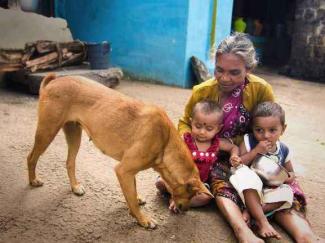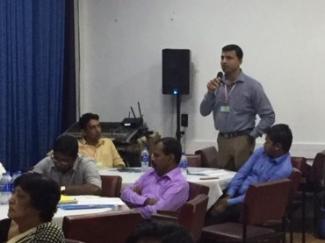India: In-country SARE workshop defines needed steps towards rabies elimination
In preparation for the South Asian Association for Regional Cooperation (SAARC) meeting in June 2019, a Stepwise Approach towards Rabies Elimination (SARE) workshop was held in New Delhi, India to assess its progress in rabies control. Coordinated and driven by GARC, the workshop was conducted from 6–8 June, with federal representatives from various ministries, including the Animal Husbandry Commissioner and the Joint Secretary of Livestock Health.
Participation in a SARE workshop allows countries to analyze and plan rabies control activities using the SARE’s multi-stage planning, monitoring and evaluation tools. Each stage has practical, measurable steps to be implemented in a country’s rabies control programmes from Stage 0 to Stage 5.
The SARE workshop was immensely successful in demonstrating India’s strengths in the SAARC region in terms of rabies diagnosis. Overall, India scored 1.5 on the SARE scale, indicating that the country has a solid foundation in rabies control efforts and has demonstrated several individual successes in anti-rabies at a sub-national level. This score is truly remarkable given the sheer size and scale of the efforts in India, especially when considering that the estimated number of human rabies deaths accounts for almost 40% of the global estimated burden. Key pending activities were prioritized for the short-term using the Workplan component of the SARE tool, with a specific focus on
-
drafting and updating the formal case definitions and
-
ensuring that only high-quality vaccines are used throughout the country.
Complexities with the federal state system of governance can create some challenges with communication and information sharing, especially in a country as large as India (where some states are the size of small countries). Reports from states across India provided deeper insight into the various rabies control and elimination initiatives occurring within each independently governed state. The SARE workshop also provided a valuable platform to foster improved communication and knowledge sharing across the states. Furthermore, to highlight the importance of collaboration, Mission Rabies representatives from the Goa State rabies elimination project also provided insights into their work.
By the end of the workshop, attendees had already completed some tasks:
1) nominations for representatives to the national rabies task force were generated and
2) a list of regional laboratories certified in the fluorescent antibody test (FAT), the gold standard test for rabies, was created.
The laboratory list will provide health professionals in each state with the location of the nearest laboratory capable of rabies diagnosis, facilitating a more rapid diagnostic outcome.
After India’s successful SARE assessment, it was suggested by the group that another assessment be undertaken within 1 year (before the end of 2020) to re-assess the situation and measure progress made throughout the year towards achieving the prioritized activities. Furthermore, it was suggested that the SARE assessment be undertaken at a state level to help focus, plan and drive specific efforts within each state, under the overarching national SARE work plan.
Submitted by Dr Terence Scott, GARC

